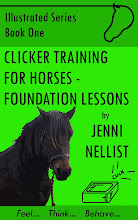This is a subject that is frequently on my mind. Ethics are not something that can be forced onto others, they are a personal matter derived from what you know, think and feel about a matter. Despite this, many people promote more 'ethical' ways of doing things in many aspects of life, not just horsemanship. I play quite a substantial part in promoting more ethical ways of keeping and interacting with horses so I'm as guilty of the implied charges as anyone. Realising this brings me to thinking about what ethics are, and where they stand in relation to what we do with our horses.
We who care about horses are likely to consider the effects of our behaviour on them. And what we understand of our impact on them shapes our future behaviour towards them. This is so for many people who interact with horses, yet on any given day, at any given location where there are horses, we can observe a variety of human behaviour towards horses with varying impacts on them. We might not think that all of these impacts are good for horses, despite good human intentions.
Whenever we find that we might be lacking in information, there is a growing body of scientifically verified information availible on the effects of human behaviour towards horses that we can draw on. I'm not saying that science knows all and that it should be followed to the letter. What I am saying is that many aspects of human behaviour towards horses has been examined via rigorous, objective scientific method. As such, such information has a solid foundation in fact, sometimes confirming what tradition has always told us, sometimes blowing tradition out of the water. Being open to scientifically verified information can be most humbling as well as most enlightening and empowering. I find it most useful when acknowledged, and where appropriate, drawn into daily practise. Take 'equitation science' as an example. Some scientists have identified what many already know regarding the education of the riding horse. This knowledge has been distilled down into key points that some have pointed out to me as being highly mechanical, removing the 'feel' from horsemanship. I think that they can be treated as highly mechanical and appear to remove the sensitivity with which a trainer might bring to thier interaction with a horse. But I also think that the converse is true, correct training, applied with empathy for the horse will also have those key points of training held inherently within. Science's downfall is often the manner in which information is relayed, highly distilled in order to convey facts, losing feel for its subject, the horse. I think that most often this is only something lost in translation, not absent from the beginning, feel for the horse is what motivates equitation scientists in the first place.
So scientific information can tell us about how well our interactions and interventions with horses facilitate the horse's ability to be at his best. And in turn, this information can help us to decide what is ethical.
Perhaps a 'welfarist' approach might be taken. Pragmatically coming to the conclusion that you do indeed use your horse to your own end, but make a conscious decision to cause as little negative impact on your horse's welfare in the process. This, startling as it may be, does not preclude causing a little harm necesary for you to reach your own end e.g. riding using a bit when there is the alternative not to (there is a little documented evidence to suggest that bits are not good for horses and that they are happier ridden without one).
At the other end of the scale you might take more of a 'rightsist' approach, because you love to interact with the horse, but must only do so in a manner that actively enhances your horse's experience of life. After all, your horse not only has the right to be free from negative welfare, he also has the right to enjoy life. Providing your horse with all his needs, all of the time, and only engaging in interactions that bring mutual enjoyment such scratching an itch.
Perhaps instead you find yourself on a 'middle road'. An approach somewhere between the two.
No matter which of the above stances the 'ethical horseman' takes, all will consider themselves 'ethical', even though ideals and behaviour towards horses will vary greatly. Perhaps the most heated debates I've either been in, or have encountered are between people who behave differently towards horses, but who all believe they hold the moral high ground and cannot accept that the other might. Different people have different high ground!
Talk about ethics is often talk about welfare, and talk about welfare is often talk about ethics! Science might add to information that affects one's ethical stance, but it does not define the moral high ground. It is for each of you to be as informed about what horses need and like as you can be, and then find your own high ground.
Subscribe to:
Post Comments (Atom)


No comments:
Post a Comment